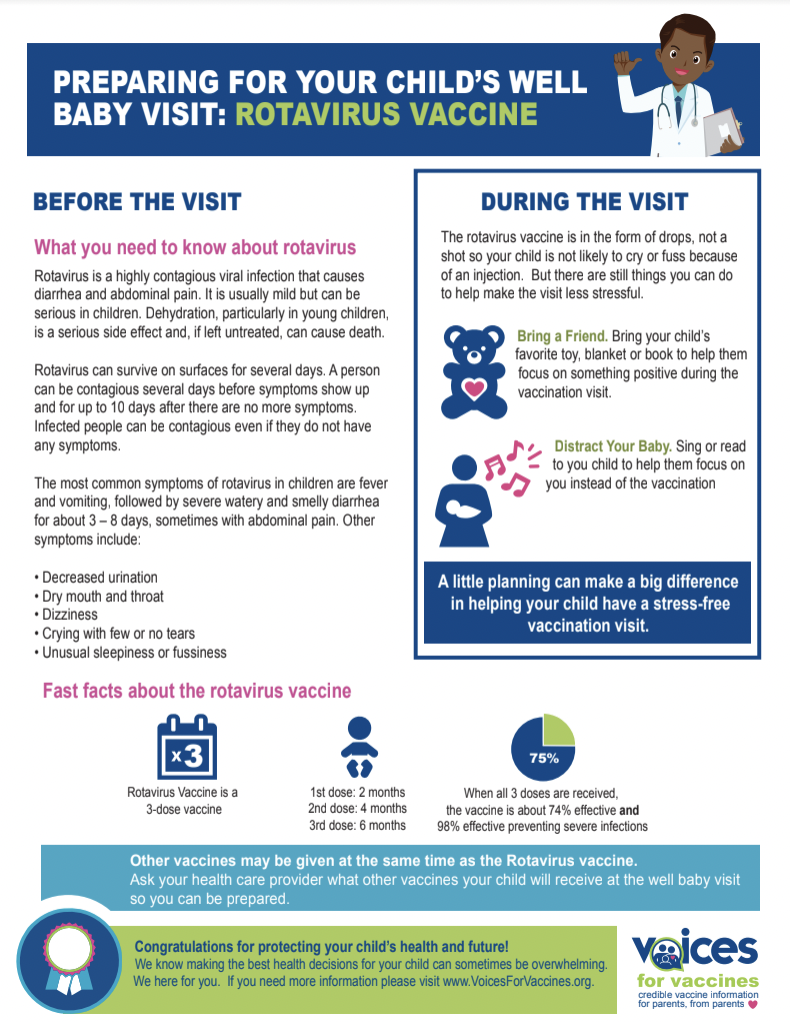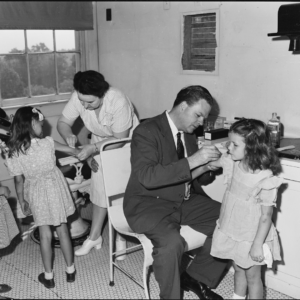Rotavirus Vaccine
What is rotavirus?
Rotavirus is a highly contagious viral infection that causes diarrhea and abdominal pain. It is usually mild but can be serious in children. It is spread from oral-fecal contamination (usually dirty hands after using the toilet). It can be spread to anything a sick person touches with dirty hands – toys, door handles, and even people. Rotavirus can survive on surfaces for several days. A person can be contagious several days before symptoms show up and for up to 10 days after there are no more symptoms and can even be contagious even if they do not have any symptoms.
The most common symptoms of rotavirus in children are fever and vomiting, followed by severe watery and smelly diarrhea for about 3 – 8 days, sometimes with abdominal pain.
Other symptoms include:
- Decreased urination
- Dry mouth and throat
- Dizziness
- Crying with few or no tears
- Unusual sleepiness or fussiness
What are the risks from rotavirus?
Dehydration, particularly in young children, is a serious side effect and, if left untreated, can cause death.
Call your healthcare provider if your child has:
- Diarrhea for more than 24 hours
- Frequent vomiting
- Black, tarry, or bloody stool
- A fever of 104° or higher
- Seems lethargic, irritable or in pain
How effective is the rotavirus vaccine?
The rotavirus vaccine is over 85% effective at protecting against severe rotavirus infection in the first two years of life. Some babies may still get rotavirus, but the disease is usually less severe.
How safe is the rotavirus vaccine?
Rotavirus vaccine is very safe. Side effects are usually mild and go away on their own. Side effects include:
- Fussiness
- Diarrhea
- Vomiting
In some studies, researchers report a small increase in cases of intussusception (a bowel blockage requiring treatment in a hospital). The risk of intussusception is about 1 case for every 20,000 to 100,000 infants after vaccination. Before the vaccine, every year about 1,900 infants under age one developed intussusception.
When should my child get the rotavirus vaccine?
There are two different rotavirus vaccines. Depending on the vaccine your child receives, they should be given 2 or 3 doses at:
- 2 months
- 4 months
- 6 months (if using the 3 dose vaccine)
Talk to your healthcare provider about what vaccines your family needs.
What can I expect at a rotavirus vaccine appointment?
A little research before your child’s well baby visit can go a long way to reducing your stress and concerns. Credible information helps ensure healthy choices and builds vaccine confidence.
Rotavirus Fact Sheet
Is your baby due for a rotavirus vaccine? Download our rotavirus vaccine fact sheet to prepare for your appointment.
Where can I get more information?
These organization are vaccine experts and can provide credible information:
How do I know this information is credible?
We work for parents so we make sure that parent concerns are addressed using facts and science and our content is reviewed by experts who have spent their careers studying vaccines. Learn more about how we ensure we are bringing you the best information to help you make healthy choices for your family.
Know the risks: Rotavirus


Did you know that before the rotavirus vaccine…
almost every child in the U.S. had rotavirus at least once before their 5th birthday?
Rotavirus causes…
- fever
- abdominal pain
- severe diarrhea

Severe diarrhea can require hospitalization.
But Rotavirus can be prevented.
Why let your child suffer when a safe and effective vaccine can prevent Rotavirus?
Don’t let anyone tell you different: The vaccine is ALWAYS safer than the disease





